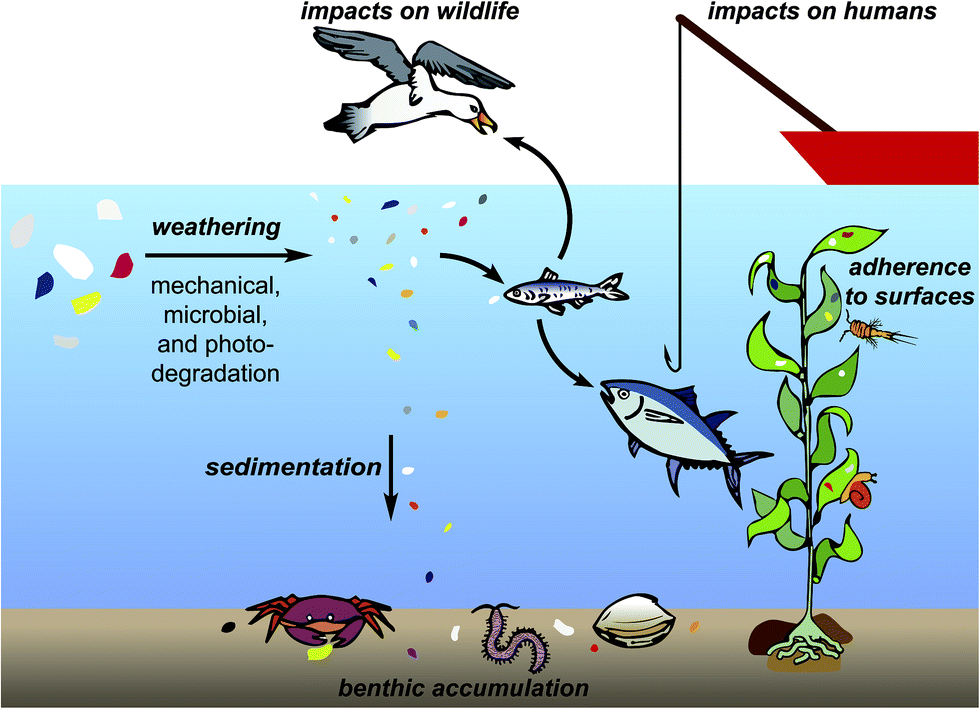 We use plastic products every day -- we drink from plastic water bottles, eat from plastic containers and use plastic packaging.
We use plastic products every day -- we drink from plastic water bottles, eat from plastic containers and use plastic packaging.
All these products end up in our environment, polluting our environments and ecosystem as we have written here. But the influence of plastics may extend beyond harming marine life.
A recent study has shown that humans have ingested plastics in the form of microplastics. How do we know? These scientists have found lots of tiny pieces of plastics in human feces!
What Are Microplastics?
Microplastics are just plastics that are smaller than 5 millimeters in length. There are two types of microplastics: ones that were purposely made, and ones formed from the breakdown of larger plastics.
 Microplastic that are purposely made are commonly found in cosmetics, artificial turf and glitter until people started to realize that these beads of plastic were finding their way to waterways and harming aquatic wildlife.
Microplastic that are purposely made are commonly found in cosmetics, artificial turf and glitter until people started to realize that these beads of plastic were finding their way to waterways and harming aquatic wildlife.
On the other hand, larger plastic objects like car tires, synthetic clothing, and plastic bottles release microplastics as microscopic pieces of plastic break off every time they are used by humans. In addition, plastic objects lying around in the sea or on land degrade to microplastics through exposure to nature.
While microplastic pollution is mostly associated with water bodies, they are found in the air as well as the soil. Many organisms have ingested these fragments of plastic, and that includes humans. So, what steps can we take?
Single-Plastic Ban In The U.K
Countries across the globe have banned or limited the use of plastic bags and plastic straws. Several companies through the UK Plastics Pact aim to eliminate all single-use packaging in the United Kingdom.
The European Union has taken one more step forward in finding a solution. Prior research has shown that every year, over 150,000 metric tons of plastic are thrown into European waters. After a measure was proposed in May 2018, the European Parliament has recently voted for a complete ban on all single-use plastics.
 This includes banning plastic bags, cutlery, straws, cups, and cotton buds in all EU countries. These items were chosen to be banned because they could be easily replaced with non-plastic alternatives, like paper straws or paper plates.
This includes banning plastic bags, cutlery, straws, cups, and cotton buds in all EU countries. These items were chosen to be banned because they could be easily replaced with non-plastic alternatives, like paper straws or paper plates.
For the other objects that will not be easily replaced because an alternative has not been found, a reduction in consumption has been set. For instance, single-use burger boxes are planned to be reduced by 25% by 2025.
In addition, a recycling target has been set for plastic bottles and fishing gear. The nations must recycle 90% of plastic bottles and 15% of fishing gear by 2025. Finally, all member countries will be assigned the task of informing the public about plastic disposal and pollution.
Even though this is a drastic move, the EU's solution is a small drip in the bucket. There are still over 8 million metric tons of plastic entering our oceans each year. Nevertheless, it is still a big step forward, and we need to make more decisions like these to solve the problem as much as we can.
Sources: NOAA, BBC, NYTimes









